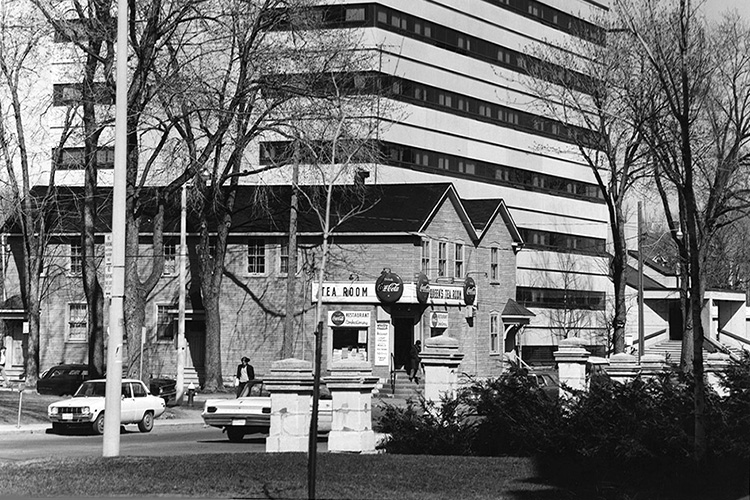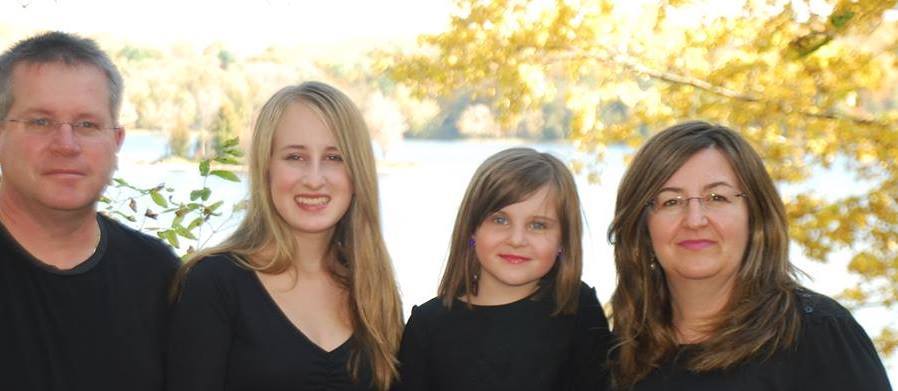What is Greekhood? It is something Greek Canadians seek to preserve through their traditions and language; it is something that shifts between generations and geographical locations; and its ability to continue into the future is something that has many Greek Canadians worried. In this section of the tour, we will explore how the idea of Greekhood was spoken about among our narrators, and how the experience of expressing one’s Greekhood shifted over time. We will also explore the experiences of Greeks in Kingston who marry Non-Greeks, and how Greekhood was maintained or adapted through these unions. Finally, we will explore some of the fears held in the Greek community about the ‘future of Hellenism’, since the language usage, as well as Church attendance, is declining among younger generations.
Queen’s played an important role in our community not only for its employment opportunities, but also for its education opportunities. As the typical twentieth-century Greek immigration story goes, once the first generation of Greek immigrants had established successful businesses (typically restaurants), they would emphasize post-secondary education for the next generation. Many members of our community have either worked for or studied at Queen’s university.
Toula Leos’s family, for example, owned the Queen’s Tea Room throughout the mid-twentieth century on Queen’s campus. They served beef, eggs and bacon, pasta, milkshakes (“a lot of milkshakes!”), ice-cream, ice cream sandwiches, and much more. Toula remembers there were always a lot of university students there, and it was always very busy around graduation ceremonies.
Fil Menikefs, along with his brother Leukos, immigrated to Canada from Cyprus in order to study at Queen’s University in 1951. In his interview, Fil describes what the employment situation for Greek immigrants after the 1950’s was like. Greeks that came later than 1950’s had a hard time buying a house and starting a business, and so most of them began by working in restaurants. He feels that Greek immigrants worked very hard. Many Greeks worked in a leather factory at that time because it was hard and undesirable work for others. When the leather factory in Kingston closed, he remembers that a lot of Greeks found employment at Queen’s University either as cleaners or working in maintenance.
MAINTAINING GREEKHOOD AMONG GREEK CANADIANS
As Chimbos describes when he writes about the Greek experience in Canada, Greeks have a strong attachment to the ‘motherland’, which often results in many Greek Canadians living “in two different worlds” (1980, 136). Second generation Greek Canadians are often taught Greek values at the same time as the host society’s values (150), and even these generations which have grown up in Canada have a strong reverence for their Greek heritage. As for Greek immigrants in Canada, 93% identified themselves as only Greek when asked what they were (Chimbos 1980, 139). This is not to say that Greek immigrants are unsatisfied with life in Canada. As Anastasia Kaketsis saw in her study on Greek immigrant women in Canada, Greeks just did not show “a high level of social integration”, in part due to the strong sentimental ties many have to Greece (2000, 15). Greek values can be especially maintained in Canada due to its strong multiculturalism policy (Georgas et al. 1996, 334).
In the process of integrating into a new society, a process also known as acculturation, some characteristics may quickly change, such as food and clothes; others, like religious beliefs, may persist and be maintained from generation to generation (Georgas et al. 1996, 335). One of the core values of traditional Greekhood is that of philotimo, or the “love of honour” (Kaketsis 2000, 38). Honour plays a big role in the Greek culture, and so it is natural that this idea of honour is maintained when Greek immigrants build families and communities in Canada.
The best example I can think of this philotimo came up during an interview with Maria Karis Brousalis (a second-generation Greek in Kingston) and George Katinas (a first-generation Greek in Kingston). They spoke about the Greek mannerism of fighting over paying the bill at a restaurant. It would seem improper, and would give the appearance of a low social status, to expect others to pay for your bill. In the same vein, it is improper among Greeks to accept food the first time it is offered: one has to be begged to eat in order to accept the offer! Maria and George laughed about a time when George’s Greek relative rejected an offer of food from a Canadian, and so the Canadian did not pester and took the tray of food away; she then said to George, “why did they they take the food away? I wanted some.” It was a desire to maintain a face of honour that prohibited her from jumping at the chance to eat the food when she was asked. Likewise, when George first came to Canada he would buy drinks for his friends at a bar. He would expect, as philotimo would have it, that they would alternate taking turns paying. Instead, his friends never reciprocated (as per a Canadian culture where buying everyone’s drinks is not considered a normal nor expected thing to do), and so George’s first thought was that “they had no philotimo”.
These sorts of culture clashes are common among Greek immigrants. George Katinas found Anglo-Canadians to be much “colder” than Greeks at first. He came to understand that these are different cultural expectations. “It takes you a while to realize ‘here is different’,” George says, and he needed to adapt and learn the unwritten codes of the new culture. All Greek immigrants deal with the difficult adaptation to a different culture, and many Greek immigrant parents have difficulty with the contrasting social values their children are being introduced to in host societies, such as the non-traditional social events in which boys and girls may interact (Kaketsis 2000, 42). A narrator for our project, Paula Antonakos-Boswell, whose parents immigrated from Greece, found her Greek parents to be very strict. She and her siblings were not allowed to date nor attend social events outside of the Greek community. Second-generation Greek Canadians often find themselves maintaining an “equilibrium between both cultures”; Greek immigrant homes may reinforce traditional Greek values, and even often have Greek as their first language (Kaketsis 2000, 42).
Greekhood is maintained through passing down values and traditions from generation to generation. It is also maintained through the church, the Greek school, the Sunday school, and cultural events such as Folklore. Throughout the Greek diaspora, ties to the homeland are held tightly, as such reverence for the homeland is “embedded in the very idea of Greek ethnicity in Canada” (Panagakos 1998, 68).
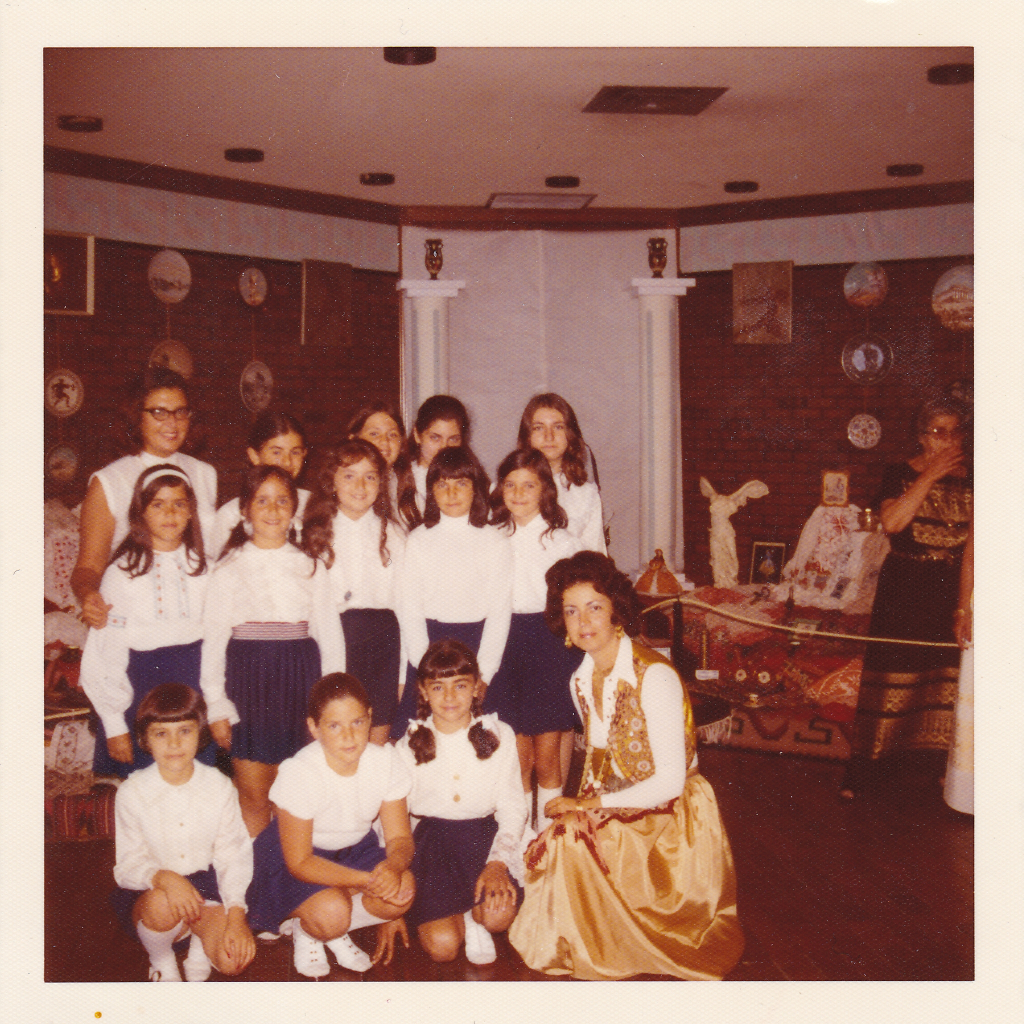
The upkeep of Greekhood – meaning, the values, language, traditions, and religion tied to Greek ethnicity – is a central focus within the Greek community. When Glyerkia Martou came to Kingston in the 2000’s, she was very surprised by the presence of the Greek community in Kingston. It made her happy, since she was able to attend church and be surrounded by Greeks when she felt homesick. In her interview for this project, she described how amazed she was that Greeks could keep all their traditions while simultaneously being fully immersed within Canadian society. She remembers a game between Greek and Canadian basketball teams wherein the Greek Canadians carried flags from both Canada and Greece. Since Greeks were able to upkeep their Greekhood in Canada, with its emphasis on multiculturalism, many Greeks feel perfectly at home in Canada. Glykeria, like many Greeks, seeks to raise her children “properly” and according to “Greek values”, which means they will be good people, will upkeep the Greek identity, will show respect to others, and will remain close to the church.
References:
- Chimbos, Peter D. The Canadian Odyssey: The Greek Experience in Canada. McClelland and Stewart, 1980.
- Kaketsis, Anastasia. “Perspectives of Greek Immigrant Women and the Education of Their Children in Canada.” ProQuest Dissertations Publishing, 2000. http://search.proquest.com/docview/304593936/?pq-origsite=primo.
- Georgas, James, John W. Berry, Alex Shaw, Sophia Christakopoulou, and Kostas Mylonas. “Acculturation of Greek Family Values.” Journal of Cross-Cultural Psychology 27, no. 3 (May 1, 1996): 329–38.
- Panagakos, Anastasia. “Citizens of the Trans-Nation: Political Mobilization, Multiculturalism, and Nationalism in the Greek Diaspora.” Diaspora 7, no. 1 (April 1, 1998): 53–74. https://doi.org/10.1353/dsp.1998.0015.
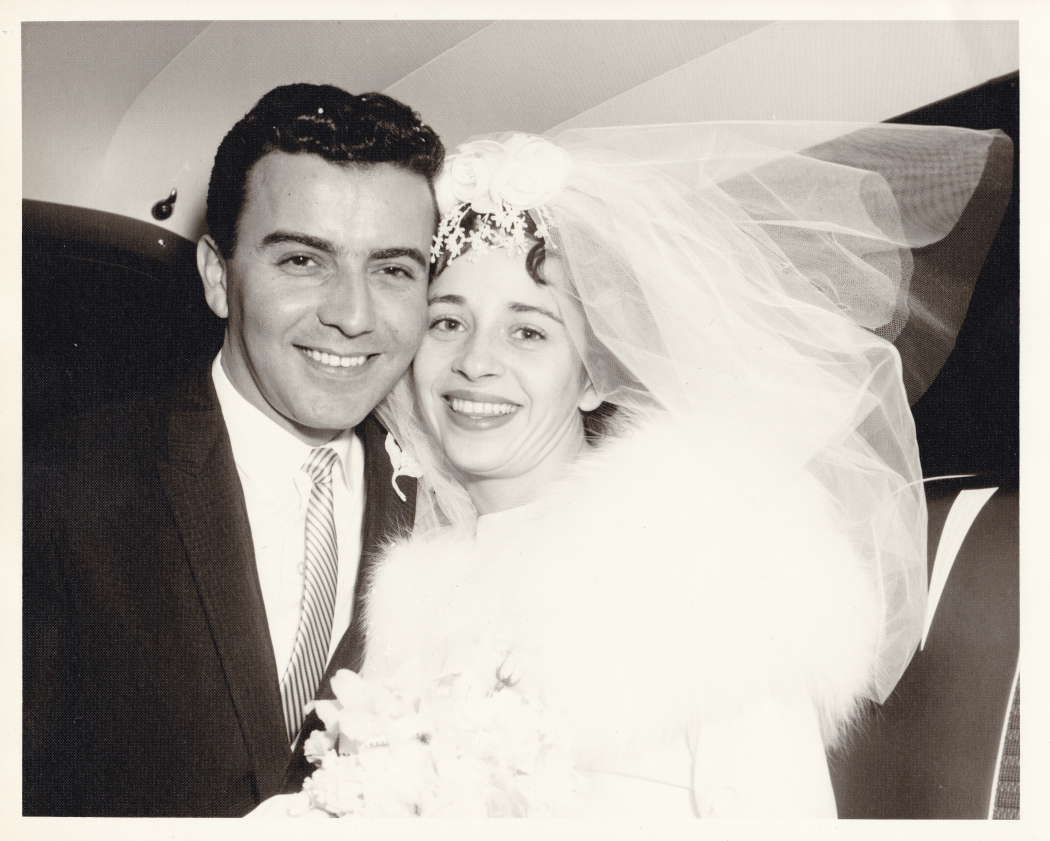
NON-GREEKS WHO MARRY GREEKS
Among those who have been interviewed so far for the Kingston Greek History Project, some have been either Greeks who married Non-Greeks or Non-Greeks who married Greeks. Among earlier, close-knit Greek generations, this was not the norm. As Greek Canadian families grew and dispersed throughout the broader society, however, Non-Greek/Greek marriages became normalized. Around the 1960s, when Maureen married Spiro Sakell, and Murva married Chris Nikas (as two members of the earlier Greek immigrant families in Kingston), Non-Greek/Greek marriages were not the norm. When the Kingstonians George Katinas and Paula Antonakos married their non-Greek spouses around the 1990s, such an inter-cultural marriage was already more normalized. In this section, we will explore how Non-Greek/Greek marriages, and the families these marriages build, still seek to upkeep Greekhood.
Spiro Sakell’s family was one of the first Greek Canadian families to immigrate to Kingston. For this project, both Spiro and his wife Maureen, a non-Greek, were interviewed. In Maureen’s interview, she spoke about how Greek traditions were kept up in the family even though none of their children married Greeks either. Maureen and Spiro have a daughter and two sons. They are proud to say that everyone in their family – their children, their grandchildren, their nieces and nephews – celebrate a portion of Greek culture. They always celebrate Greek Easter. Easter is arguably the biggest holiday in the Greek calendar, and celebrations for it include cracking eggs that have been dyed red, going to church (often for many days during the “Holy Week” leading up to Easter), roasting a big lamb, and more. Maureen feels that Greek Easter is a big important part of their lives. Many families from Greek/Non-Greek marriages celebrate both Greek Easter and Non-Greek Easter, as Paula Antonakos Boswell’s family does. The Greek Orthodox liturgical calendar follows a different calendar than the Julian calendar, and so Greek Easter and non-Greek Easter often fall on different days. Maureen and Spiro do both Easters, hosting the Greek one at their house for all their children and grandchildren. She feels that if she and Spiro said one year they wouldn’t be doing Greek Easter, everyone would object and say they had to do it. They describe watching their grandchildren keep on this tradition, and seeing the excitement their youngest grandson has when he “breaks the egg” – a traditional way of commemorating the resurrection of Christ, through cracking the red eggs against one another, symbolizing a rebirth.
Maureen learned how to cook Greek food from Spiro’s mother, Crysanthy Sakell, who was a “wonderful cook”. Maureen still cooks Greek food today: she finds the cuisine more diverse than “meat and potatoes food”. Her grandchildren do not call Maureen “Yiayia” (the Greek word for grandmother), although they call Spiro “Pappou” (grandfather). To Maureen, Crysanthy was the “Yiayia of Yiayias” and no one can replace her. Maureen did not know much about Greek culture before she married into it, but now she has fully embraced it and is an active member of our community.
George Katinas met his (non-Greek) wife when he was studying in teacher’s college. Before he met her, he was not looking to marry outside of his culture. As a recent immigrant from Greece at the time, he felt it would be too much work to marry into a different culture, with different expectations and norms. Naturally, he wasn’t wrong: he felt at first that things did not “flow as easily”, because of differences in temperament, religion, and language. However, he ultimately feels that this kind of work makes you a better person and the relationship stronger by overcoming obstacles. George passed on his Greek culture to his daughter, whom he taught Greek to and baptized into the Orthodox religion.
Paula Antonakos Boswell had a similar experience. By no means was marrying outside of her culture an easy experience at first. When Paula moved to Kingston in the 1980’s for post-secondary studies, she met Rick Boswell. Paula’s family was uncertain about Rick at first because he was not Greek, and there was an expectation (as many Greek Canadians traditionally felt) that she should be marrying a Greek. Once her parents met Rick, however, they instantly liked him. This experience did bring a lot of confusion and pressure into the relationship at first. It was difficult, Paula says, to love someone and to be told you can’t marry them – that you need to marry someone Greek. Now, she tells her own children that they must marry for love. Paula has grown to understand her parents’ contexts, and she and Rick laugh now about how similar their lives were to the movie My Big Fat Greek Wedding. Paula and Rick were married in 1994 at the Greek Orthodox church in Kingston, and their two daughters were eventually baptized there as well.
It’s very rewarding, Paula finds, to be able to experience new cultures. Rick comes from a Scottish background, and Paula has recently been working on genealogy projects, filling in both the Greek and non-Greek family trees. She is learning much about Rick’s background too, and hopes to visit Scotland to see his family’s roots, much like Paula, Rick, and the kids visit Greek often to see Paula’s. Paula and Rick respect each other’s cultures and this is important. Rick cooks a lot of Greek foods, which he learned from Paula’s mother. He cooks lentil soup (fakes), okra (bamies), lamb, potatoes, and much more. He often calls Paula’s mother for recipes. Paula feels that they keep the Greek traditions alive in their family.
WORRIES ABOUT THE FUTURE OF HELLENISM
A common worry among the community is that it “lacks youth”, as Maria Karis Brousalis put it. The Greek Community is not part of the newer generations’ everyday life, she sees. Once, when Greek immigrants came to Canada in large waves, Greek communities were needed for everyday life: it was within Greek communities that people made connections and formed networks, often leading to their employment opportunities. It was within the Greek community that people could speak their own language and practice their own religion, and combat the isolating effects of being surrounded by a different culture.
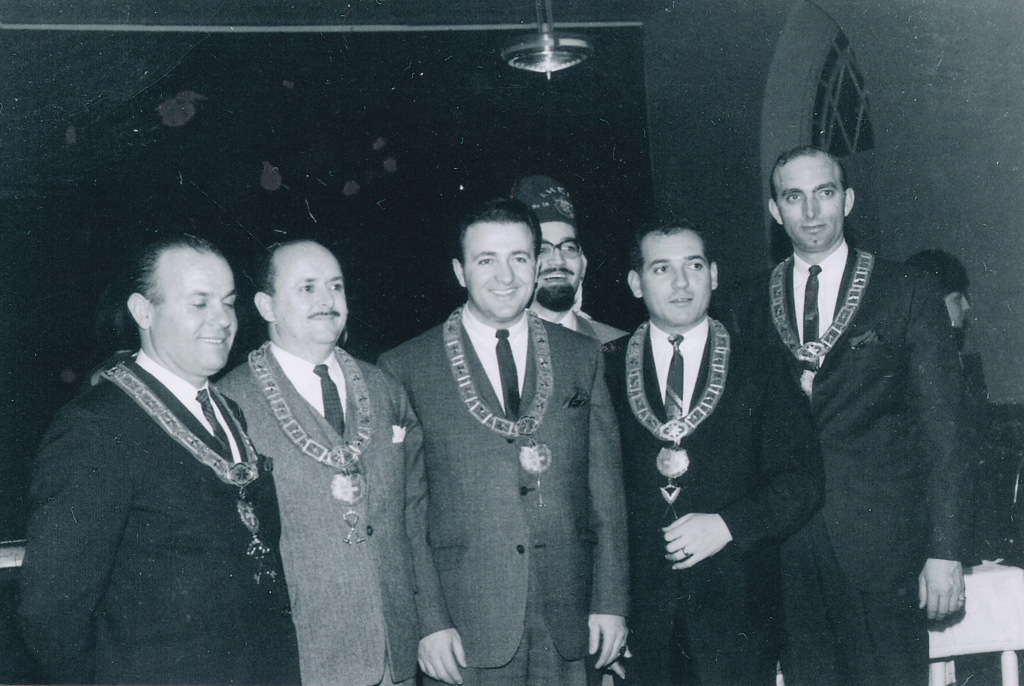
There are fewer Greek immigrants to Canada now; even within the sample of narrators found for this project, only three immigrated to Canada after the 1980’s. In general, the Greek community is an aging one, with its younger members (second or third generation Greek Canadians) not needing to rely on it like their predecessors once did. As Maria put it, newer immigrants to Canada have different circumstances for immigrating too: many immigrants throughout the early/mid twentieth century were fleeing from poverty or war, and many came to Canada with “absolutely nothing” – often not even having any English skills. Being part of a Greek community was necessary. She feels that, with no need to rely on the community, people tend to drift away from it.
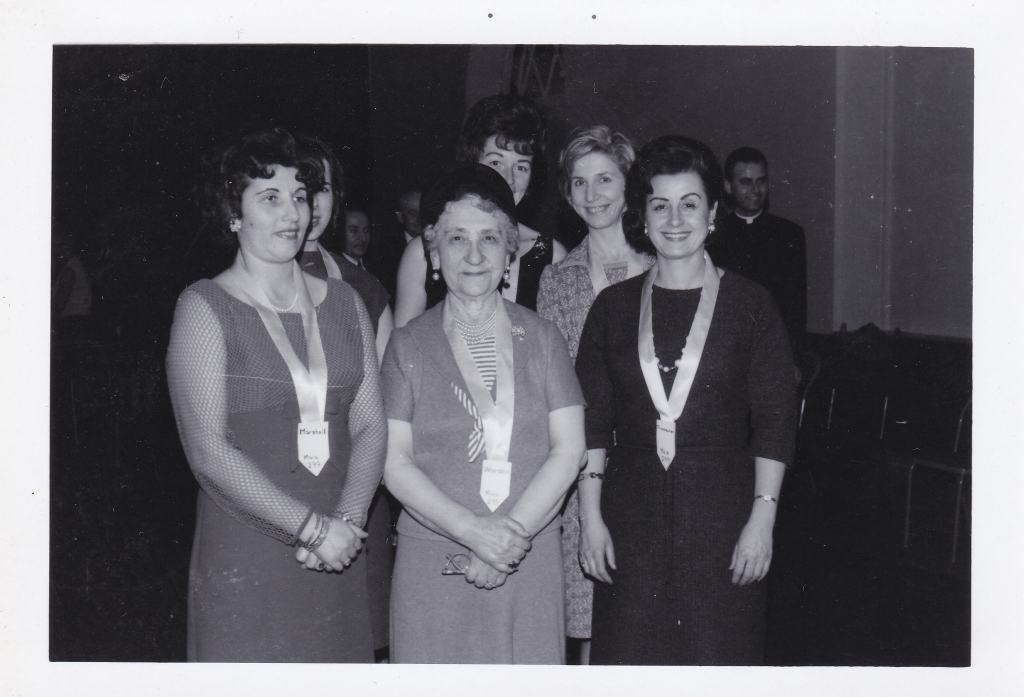
In their interviews, both John Karkoulis and his sister-in-law Maria Triada spoke about the tendency for youth today to “move on” as they grow older. John sees that many youth leave Kingston, and Kingston’s Greek community, after they graduate from post-secondary school. Maria Triada made the same observation, saying that youth “move to bigger cities” and then become uninterested in the church. The fact that our community has dwindling numbers is hard to deny. Church enrollment decreases over the years, as in many religious communities. There are many factors for this, of course. In the Greek community, wherein the church is the center point, the health of the faith is uniquely tied with the health of the community. In worrying about the future of our cultural community, then, worries about the future of our faith are typically entwined.
Voula Stathopoulos is currently the president of our Philoptohos (the church’s ladies’ philanthropic group) and believes the church needs to find a way to involve more young people. As a youth in the Greek community, one typically attends Greek school and Sunday school, accompanying parents to church and being present for major holidays, and the point where youth leave the community tends to be the point where they grow more independent from their families. The focus, many feel, should be on encouraging youth to build their own relationship with their faith and community. As Voula states, the church needs to do something to “bring younger people in”. She suggests the community shifts to recognize both the Canadian and Greek components of one’s life and that one does not need to “choose just one side”.


